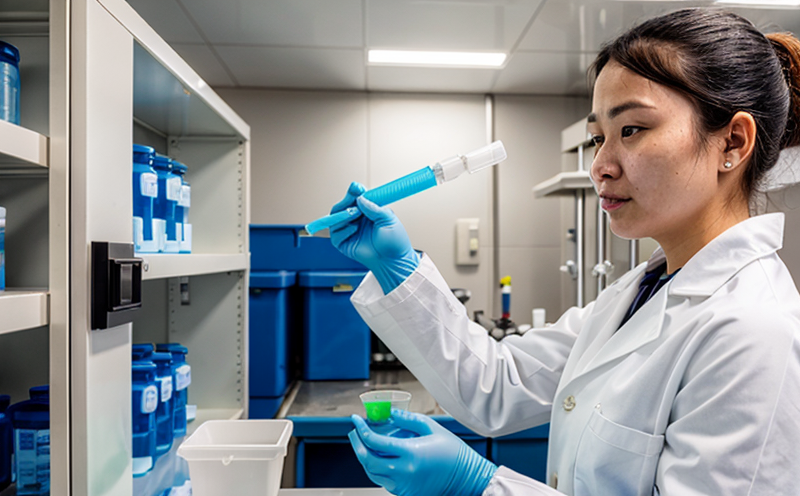USP Microbial Identification Testing
The United States Pharmacopeia (USP) is a leading authority in setting standards of quality, purity, and potency for pharmaceuticals. USP microbial identification testing ensures that drug products are free from harmful microorganisms such as bacteria and fungi, which can compromise product safety and efficacy.
This service involves the identification of microorganisms isolated from pharmaceutical samples following strict protocols outlined by USP. The process typically begins with sample preparation, where potential contaminants are collected from the pharmaceutical formulation or finished goods. These samples undergo rigorous microbiological analysis using culture-based methods and advanced molecular techniques to identify any present pathogens.
The testing adheres to ISO 14215:2013, which provides guidelines for good laboratory practices in microbiology laboratories. Compliance with these standards ensures accurate and reliable results. The identification process includes both phenotypic (using observable characteristics) and genotypic methods (analyzing genetic material). This dual approach enhances the accuracy of microbial identification.
Phenotypic methods may involve colony morphology, biochemical reactions, and physiological tests to differentiate between various species of bacteria or fungi. Genotypic methods use DNA sequencing technologies such as PCR followed by high-throughput sequencing platforms like Next Generation Sequencing (NGS). NGS allows for rapid analysis of large sets of genetic data, providing precise identification even when dealing with complex mixtures.
Once identified, the laboratory reports on any detected microorganisms along with their species and strain information. This report is crucial for regulatory submissions and internal quality control processes. Compliance officers rely on these reports to ensure adherence to Good Manufacturing Practices (GMP) requirements set forth by agencies like the FDA or EMA.
R&D engineers benefit from this service as they can use the findings to optimize formulations, improve stability studies, and design more robust manufacturing processes. Quality managers leverage the results for continuous improvement initiatives aimed at enhancing product safety and efficacy. Procurement teams also find value in knowing that raw materials used in production meet stringent microbial quality standards.
The precision and reliability of USP microbial identification testing are paramount in maintaining trust within the healthcare industry. By adhering strictly to USP guidelines, laboratories like Eurolab provide robust support for pharmaceutical manufacturers seeking to protect public health while ensuring compliance with international regulations.
Eurolab Advantages
At Eurolab, we understand that microbial testing is critical for maintaining the highest standards of drug quality and safety. Our expertise in this area sets us apart as a premier provider of USP microbial identification services:
- We employ highly trained microbiologists who are certified by relevant bodies.
- Our state-of-the-art laboratory facilities are equipped with advanced instrumentation necessary for accurate microbial identifications.
- We follow strict ISO 14215:2013 guidelines to ensure our methods and results meet international standards.
- Our team provides comprehensive reporting tailored to meet specific client needs, including regulatory submissions.
- We offer quick turnaround times without compromising on the quality of our analyses.
- Dedicated customer service ensures that any queries or concerns are addressed promptly.
Choose Eurolab for your USP microbial identification testing requirements and experience unparalleled support in ensuring product safety and regulatory compliance.
International Acceptance and Recognition
The importance of microbiological testing cannot be overstated, especially within the pharmaceutical sector. The acceptance and recognition of USP microbial identification testing extend globally due to its stringent quality controls and consistent reliability:
- The results obtained from USP tests are widely accepted by regulatory authorities worldwide.
- Pharmaceutical companies often require their suppliers to undergo USP compliance checks before entering into long-term contracts.
- Many countries recognize the standards set forth by USP, making it easier for pharmaceutical manufacturers to export their products internationally.
- Research institutions frequently use USP methods as benchmarks when conducting independent studies on microbial contamination in drug formulations.
The widespread adoption of these testing protocols underscores its significance in ensuring global consistency and trust within the industry. By participating in such rigorous evaluations, pharmaceutical firms enhance both their reputation and marketability.
Use Cases and Application Examples
USP microbial identification testing plays a vital role across various stages of the pharmaceutical lifecycle:
- During development: Ensuring that new drug candidates do not contain harmful microorganisms.
- In manufacturing processes: Monitoring ongoing production runs to catch any potential contamination early on.
- For quality assurance: Providing periodic checks to verify that existing products continue to meet established standards.
- In formulation optimization: Helping researchers identify optimal conditions for minimizing microbial growth during storage and use.
- During stability studies: Assessing how well different formulations withstand exposure to various environmental factors over time.
- For regulatory compliance: Supporting applications for marketing approval by providing robust evidence of product safety.
These real-world applications demonstrate the versatility and necessity of USP microbial identification testing in safeguarding public health and upholding high standards of pharmaceutical excellence.





